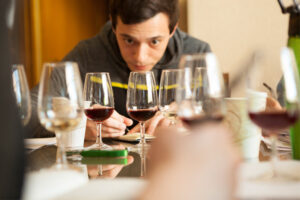
What’s the difference between an amateur and a professional? You might say that the latter is someone who’s paid to practice a given skill, while the former engages in it purely for love of the thing (that’s the etymology of the word, after all), though non-monetary gratification might be a better way to describe it. In each camp you’ll find people passionate about their pursuit, displaying real expertise and with a fund of experience — and others who seem to be less engaged, with less energy and enthusiasm for keeping up with new developments and trends in the field.
Historically, one element separating the two has been official infrastructures of training and certification that normally accompany the professionalization of any activity. At one end of the spectrum this takes the form of university-level courses followed by several years of supervision by more experienced practitioners, board certification and so on. At the other end are less demanding occupations where professional status can be attained with less effort, time and expense.
Some are deemed important enough for the state to become involved (the licensing of morticians or master plumbers, say). Others are not. And while you can receive a degree in enology (winemaking), you don’t need professional training or any sort of certification to work in a vineyard or cellar or to sell or write about wine.
Wine professionalization of the sort I’ve described here is a relatively recent phenomenon, and it, too exists on multiple levels, from the arduous, scholarly Masters of Wine program and Court of Master Sommeliers diploma level certification (prepare to give years of your life over to the pursuit of recognition by one of these outfits), to the less demanding coursework provided by the Wine and Spirits Education Trust and other local resources.
Whether any of these are something worthwhile for you, is, of course, a personal matter. But one substantial and enduring benefit of such programs is simply the opportunity to taste much more wine than you would ever be likely to afford on your own, in an environment of structured learning and conversation. It’s the kind of environment we try hard to create, informally and on a modest scale, in our weekly tasting events (see below) at our Huron Ave. shop.
We call it practicing wine without a license and you’re welcome to take a test drive.